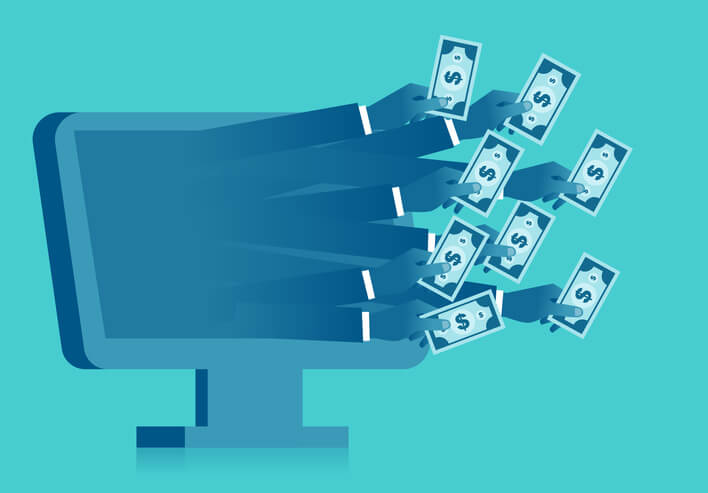As a small-business owner in these uncertain times, we know you are always under pressure. If expenses pile up, entrepreneurs may be tempted by fast money loan products they may later regret.
A fast money loan may seem like the answer to maintain cash flow, control costs, meet payroll and sometimes replace equipment. However, it is important to ask the right questions and understand all the details so you can ensure the loan is a smart move for you and your business.
FAST MONEY WITH A BIG PRICE TAG
Fast money loan options, including the Merchant Cash Advance, can often drain a small business with jacked-up fees and hidden interest rates, obscuring the true cost of a loan.
“These can be dangerous,” said Chuck Sinks, who heads the business advising department at CDC Small Business Finance. “The cost of funds from many of these alternative lenders can be ridiculously high.”
These expensive loans are designed to appeal to businesses that have an urgent need for cash. It’s important to ask the lender questions so you understand the true cost of the money you are borrowing.
Why a Merchant Cash Advance is Expensive:
Companies that provide a Merchant Cash Advance, also known as an MCA, base the transaction on a borrower’s future credit-card sales. The lender scoops up a percentage of credit-card receipts based on an agreed-upon rate every day until the advance is fully repaid with interest.
Similarly, other cash-flow loans consider the average daily balance of a business checking account to estimate revenues. That allows the lender to calculate a debit amount that will come out of the account every day for repayment.
To make matters worse, these loans are purposely made easy to get from a variety of alternative lenders on the internet with no scrutiny.
Behind these seemingly innocuous transactions loom outrageous and often hidden rates, costs and fees, making MCAs and their ilk some of the most expensive types of business financing available.
“We have a client who was looking to acquire another brand and took several advances to help determine the value of this potential new asset,” said Nick Miluso, CDC’s Relationship Manager Team Lead. “When she came to us, her monthly payments were about $6,000. We were able to consolidate her various advances into one loan that dropped her payment to $1,600. She was thrilled.”
WONDERING HOW FAST MONEY LOANS WORK AND HOW THEY MIGHT AFFECT YOUR BUSINESS?
Download our free e-book to fully understand what taking on an online loan truly involves and how it can impact your bottom line.
In our e-book we break down everything you need to know into easy-to-grasp terms and examples based on real-life situations.
[text-blocks id=”10471″ slug=”cdc-ebook-download”]
BORROWER BEWARE: PITFALLS WITH FAST MONEY LOAN OPTIONS
Hidden rates, costs and fees can add an additional 40 to 350 percent, depending on the lender, to the size of the loan.
Here are some keys to help you avoid many of the pitfalls that come with a fast money loan:
- Know how APR affects your loan. More sales mean a higher APR. APR — or annual percentage rate — is different than an interest rate. It includes interest costs plus fees related to a loan, and it tells you how much a loan will cost in one year. For MCAs repaid with a percentage of credit-card sales, the APR depends not just on the total fees paid but also on how fast you repay the loan. The more credit-card sales you make, the faster you repay the MCA, and subsequently, the APR increases.
- There’s no early payment benefit. Borrowers repay a fixed amount of fees no matter what and get no interest savings from early repayment.
- Think twice about a contract that is hard to understand. Contracts can be confusing and MCA providers do not provide APRs, which makes it impossible to compare other financing products.
- Ask if the lender is regulated. MCAs and many quick online lenders lack the level of federal oversight extended to many consumer transactions. “In business lending, a lot of consumer protections come off because you’re supposed to have some business acumen and financial literacy,” said Sinks.
- Understand the impact of multiple advances. MCAs are fast and easy, and can quickly pull you into a debt spiral as you need another advance to repay the first one, a process known as “stacking.”
All these can compile with a devastating impact.
“There is often a singular event that led business owners to have a need for quick capital,” Miluso said. “It wasn’t their day-to-day business operation. It was something urgent – a piece of expensive equipment broke or a client went out of business, leaving the business owner unpaid. They’re in a bind thinking, ‘Where do I go?’ If they take that first MCA loan, it’s a very, very hard cycle to break. I’ve seen the toll it takes on people. They’re in tears, mentally and emotionally broken.”
TIPS TO AVOID HIGH-INTEREST DEBT FOR A FAST MONEY LOAN
Our small business experts, Sinks and Miluso, offer three rules for cash-strapped business owners.
- Be sure about why you need the money and how quickly you need it. “Know how much you need and stick to that number — do not get upsold,” Miluso said. “If you need $20,000 or $30,000 but your business could cover $100,000, they’re going to sell you $100,000 and that’s potentially detrimental to your company.”
- Don’t rule out nonprofit lenders. CDC Small Business Finance, a nonprofit lender, offers many loan solutions. Because they are not a bank they have more flexibility to help you get financing or can refer you to a resource that is trusted and will serve your best interests.
- Always figure out the true cost of any loan. “The cost of capital from alternative lenders is opaque and the entities making these loans are very good at hiding what the APR is. It’s very diabolical,” Sinks said. “We counsel clients to look at the cost of capital.” It is worth your time to ask questions so you understand the true repercussions of any fast money loan you get for your small business.
STEPS TO MAKE SURE YOUR SBA LOAN ISN’T FRAUD
“Fraudsters have already begun targeting small business owners during these economically difficult times,” according to the SBA, which warned owners in particular of grant and loan fraud and phishing schemes. Follow these steps to protect yourself against fraud.
- SBA does not initiate contact. If you are proactively contacted by someone claiming to be from the SBA, suspect fraud. The SBA will not initiate contact with you on SBA loans or disaster relief loans or grants.
- There is no upfront payment. If you are contacted by someone promising to get approval of an SBA loan, but requires any payment up front or offers a high interest bridge loan in the interim, suspect fraud.
- Email must end in @SBA.gov. Any email communication from SBA will come from accounts ending with sba.gov.
To learn more about SBA fraud click here.
HOW TO REPORT FRAUD:
The SBA Office of the Inspector General also has a hotline for reports of suspected fraud. Call 800-767-0385 or file a report online.
Tell our loan experts about your business, and they’ll work to match you with a financing plan that best suits you. Let’s talk! Reach us at loaninfo@cdcloans.com or (619) 243-8667.
STAY CONNECTED
Get the latest small business news and tips:



